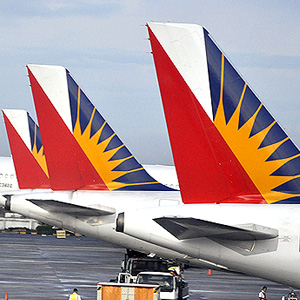National flag carrier Philippine Airlines (PAL) has implemented its plan to layoff some 2,600 employees by September 30 as the airline applied the outsourcing of its catering, call center and ground services last October 1.
PAL President Jaime Bautista said the outsourcing set-up is a painful but necessary decision for the company. He assured affected workers they will receive their separation pay and other benefits. A total of PhP2.5 billion has been allocated for the employees’ severance package.
The Sky Kitchen (catering), Sky Logistics (airport services) and SPi Global (call center reservations) are the ones tapped to provide the outsourcing. The workers were given until September 9, 2011 to express their intention to be absorbed by the three firms tapped by PAL.
Members of the Philippine Airlines Employees Association (Palea) have staged protests against the outsourcing plan. Just last Friday (September 31), a total of 71 PAL flights were canceled due to work stoppage by the employees union.
Nine international flights to and from Hong Kong, Fukuoka, Macau and Singapore and domestic flights to and from Cebu, Dumaguete, Cagayan, Laoag, Iloilo, Davao, Butuan, Legaspi, Zamboanga, Tacloban, General Santos, Puerto Princesa, Tagbiliran, Dipolog and Cotabato were all cancelled.
The strike also caused long lines at the check-in counters, which were manned by newly hired employees from a private outsourced company. There were also delays in the departure and arrival because of the slow pace of loading and unloading baggage from the planes. Dismissed PALEA members have barricaded the PAL in-flight catering services complex near NAIA Terminal 2.
PAL has said that the outsourcing plan is necessary for the company to survive. The airline said it lost US$312 million for its 2008 and 2009 fiscal years. PAL said that while it posted modest profits of US$72.5 million in 2010, it is again back in the red after recording US$10.6 million losses for the first quarter of its current fiscal year due to unstable fuel prices, the devastating earthquake/tsunami in Japan and the lingering conflict in the Middle East and North Africa.
Executive Secretary Paquito Ochoa Jr. has upheld PAL’s outsourcing plan. Palea earlier filed a motion for reconsideration before the Office of the President questioning Labor Secretary Rosalinda Baldoz’s decision affirming the plan.
While the Palace has upheld PAL’s plan and at the same time called on the company to let the workers air their grievances, it has not prepared enough for the effect of the work stoppage. It cannot be denied that the effect of the labor strikes was huge as a number of international and domestic flights were cancelled. The negative effect will not only reflect on PAL but on the government policy.
While it is true that the worker issues in the national flag carrier have been thorny from the start, it cannot be denied that it will have an effect on prospective investors in the country. Foreign investors have long regarded the labor situation as crucial in their choice of destination.
PAL said it has undertaken contingency measures to thwart the effect of work stoppage. But apparently, it has not undertaken the necessary training of new hires. The outsourced workers were not able bring a semblance of normalcy to operations even days after the start of the work stoppage.
The airline has also not prepared itself with protests in their provincial office as locked-out and laid-off PALEA members in Cebu have set up their own campout at the Mactan International Airport. This is not good for overall security as airports become vulnerable against radicals and other criminals.
Following the work stoppage, Palea members affected by the outsourcing have been out of the airport and PAL office since September 27. PAL and the Manila International Airport Authority have changed all access passes so breach is difficult, sabotage even more so.
PAL has employed several service providers, administrative volunteers and former Palea members who signed up for the outsourcing. These workers basically know the job. The work also involves non-core support services only. It has nothing to do with aircraft maintenance.
Nevertheless, risks still remain in PAL. Palea is militant. Its officers and members are into desperate and face-saving situation. Any group or person can exploit the situation to embarrass government, management and even the union itself.
For the updated article, click here






